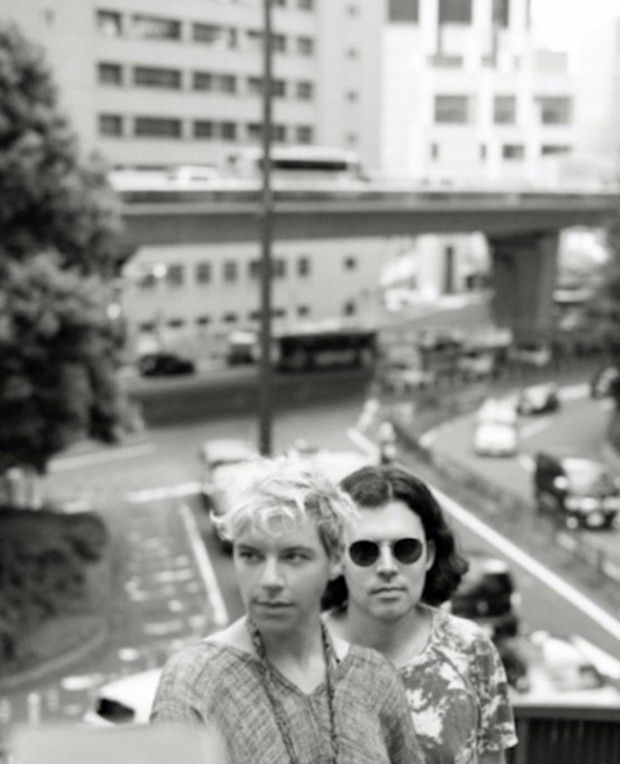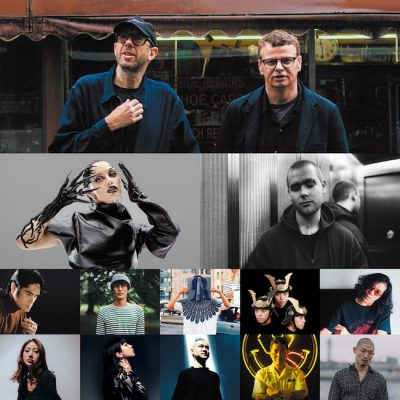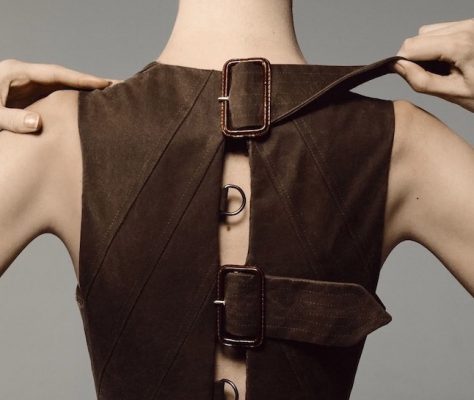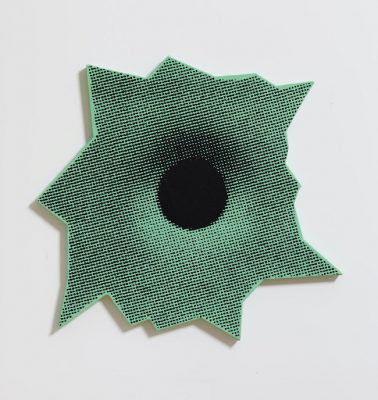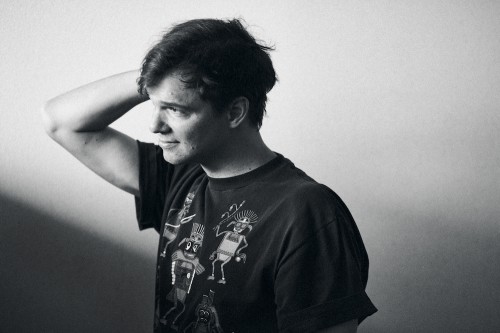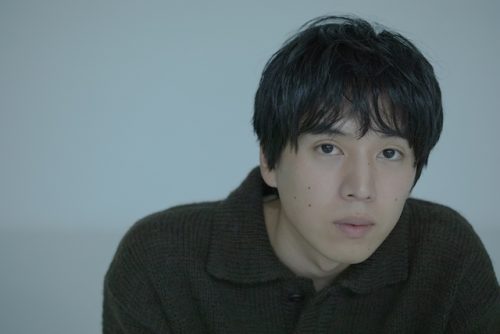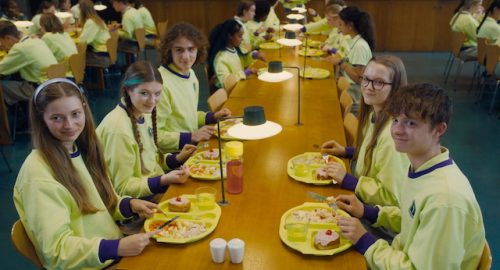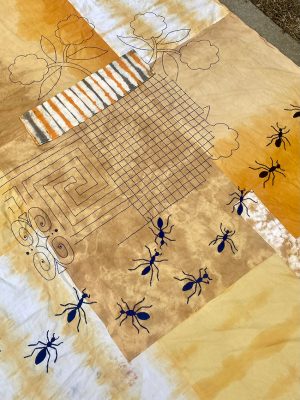
長年の制作パートナーであるネイト・ブレナーがメンバーとして加わり、メリル・ガーバスによるソロ・プロジェクトからデュオへと生まれ変わったチューン・ヤーズ。その新たな体制でレコーディングされた4枚目のアルバム『アイ・キャン・フィール・ユー・クリープ・イントゥ・マイ・プライヴェート・ライフ』は、「80年代サウンドを彷彿とさせる音作り」をコンセプトのもと、モダンなダンス・ビートやエレクトロニックなプロダクションが前面にクローズアップされた作品となった。ミキシング/マスタリングを、ソランジュやケンドリック・ラマー、チャンス・ザ・ラッパーの諸作も手がけるエンジニアが担当。人種やジェンダー、環境問題などアイデンティティ・ポリティクスを扱ったテーマも今作を語るうえでの重要なポイントだろう。フジ・ロック出演の前日、都内でふたりに話を聞いた。
ーー今回のアルバムは文字どおり、チューン・ヤーズとしての新たなスタイルが提示された作品だと思います。
メリル「そうね、バンドとして常に進化し続けたいと思ってるから。同じようなことを何度も何度も繰り返すんじゃなくて。今回デュオになったってことをはっきり提示してるのも、そうした姿勢を示したかったからなの。音楽も変化しているし、人としてミュージシャンとして、自分達自身も変化してる。私に関して言えば、自分のヴォーカルをもっと突き詰めるために、クラシックのヴォイス・トレーニングに通い始めたのね。それが曲のほうにも影響をしていて、前よりも歌全体のクオリティが高いし、今までにはないタイプの曲が歌えるようにもなったり……変化し続けるってことがこのバンドにとってはすごく重要なのね」
ーークラシックのヴォイス・トレーニングを受けたきっかけは?
メリル「ネイトにせっつかれたから(笑)」
ネイト「僕がもともと5年前くらいからヴォイス・トレーニングを受けてて。メリルはもとから素晴らしいシンガーだけど、僕は歌は初心者みたいなものだったし、それで先生を探し始めたんだ。それで何ヶ月かいろいろな先生をあたっているうちに、これはっていう先生に出会えて、自分でも効果を実感したんでメリルにも薦めたんだよ。『いや、すごい先生を見つけたから、一度レッスンを受けてみてよ』って、イヤがるメリルを無理矢理に(笑)」
メリル「最初は本当にイヤだったのよ(笑)。私が最初乗り気しなかったのは、クラシックのヴォイス・トレーニングなんか受けたら、『あなたの歌い方は間違ってる』とかって、否定されるに決まってると思ってたからなの。自分の歌い方そのものを変えられちゃうんじゃないかと思って。ただ、その先生はそういうことは一切しなかった。その先生は私の声を矯正しようとするんじゃなくて、声を開く手助けをしてくれてるっていうかなあ……とは言っても、今でも難しいし苦労してるんだけどね。自分の中で知らないうちに身につけていた悪い歌い方のクセみたいなものに気づいて、直している最中なんだけど、自分が歌っていく上ですごく役に立ってる」
—So, with your latest album, people are wondering about how those solo projects turned into something else, like now that you are dual. Also you are using a quite different approach in your music which has shown a possibility for the future (which I agree), would you explain more about the process?
Merrill : I think it is true that Tune-Yards is something that we’d like to evolve, so we don’t wanna do the same thing over and over again. So making it clear that we are dual is part of saying that the group is changing as time goes on. And also the music is changing as we are changing, as people and also as musicians. So this time I took a lot of classes, like voice lessons, and now I am able to do more with my voice. I think we are both trying to push ourselves to write better songs, or just different songs. It feels important to just keep changing.
——What made you decide that you wanted to take voices lessons?
Merrill:Nate (laugh)
Nate:I was actually taking those classical voice lessons. I started about five years ago or so. Merrill is obviously an amazing singer, but I decided to start finding a teacher. After three or four months studying with the teacher, I told Merrill like that “you should really try it out”. Because I found an amazing teacher and so I tried to convince her to do this even though she didn’t want to. But after doing it a few times, you’d realize that it is really helpful and you would know how to use your voice more properly.
Merrill: For me, I didn’t want to take that because I thought that the teacher was going to tell me that I was singing it “wrong” or “incorrectly” and she might want to change my voice. But Nate was right, our teacher, Deborah Bennett didn’t want to change our voices, she just helped relax it and opened up it more. I realized that it would be really hard, even for now, to unlearn some of the bad habits that I have, but it was really worth it. And now I can sing for a longer time.
ーーそれまで歌は独学だったんですか。
メリル「そうだなあ(笑)……子供の頃は母親とよく一緒に歌ったけど。あと12歳とか13歳のときに合唱団に入ってて、16歳か17歳のときに別の合唱団に入って、大学では『glee』みたいな(笑)、もっとポップをアカペラで歌うサークルに入ってたり、グループで歌うってことは昔からわりとしてたのね。それからアメリカやヨーロッパのフォークを歌うようになり、また別の歌い方が開けたり、いろいろなとこで歌ってはいたわね」
ーーなるほど。ただ、そうした生歌のトレーニングの一方で、今回のアルバムではデジタル加工されたヴォーカルも多用されていますよね。そのあたりのバランスについてはどう意識されていましたか。
メリル「チューン・ヤーズって、オーガニックとデジタルの絶妙なバランス感覚の上に成り立ってるっていうか、機械と女性ヴォーカルの融合、あるいは“機械対女性ヴォーカル”みたいな感じなのかな。人間と機械との共存関係みたいなものがコンセプトのひとつにあって、それは2018年っていう今であり、これから先にもっと問われていくテーマだと思うの。要するに、人間はこの先、機械とどういう関係を築いていくべきなのかっていう。日本なんかアメリカよりももっとそれが進んでると思うんだけど。私も、自分の声を機械でどこまでも非人間的な声に加工してみたり、逆に機械から一気に離れて生身の人間の声を発してみたり……その押し引きのバランスだと思うのね。デジタル対オーガニック、あるいは機械対人間っていう、その緊張感から生まれる絶妙なバランスが好きなのね」
ーー今回、ミキシング/マスタリングを手がけたミカエリン“ブルー”ブルースプルース(Mikaelin“Blue”Bluespruce)やデイヴ・カッチは、たとえばソランジュやチャンス・ザ・ラッパーの作品を通じてその絶妙なバランス感覚をかたちにしてきたプロデューサーでもありますよね。
ネイト「そうだね。R&Bやヒップホップのミックスやマスターの方法って、ヴォーカルとベースに重きを置いてるような気がして。ここで言うベースっていうのは、自分が担当しているエレクトロニック・ベースやベースドラムを含めてね。で、それ以外の要素は基本的に裏方的な存在なんだ。それがインディ・ロックの場合、ヴォーカルやベースはミックスの段階で音が下げられちゃって、そのかわりギターやキーボードが前面的にフィーチャーされてるケースが多いんだよね。ただ、自分はベース担当ということもあり、今回、あえてヴォーカルやベースにスポットライトを当ててくれる人選にしてみたんだ」
メリル「そのほうが単純に自分達らしいから(笑)」
ネイト「そう、自分達に寄せてるだけという(笑)」
メリル「私はヴォーカルで、彼はベースで、ただ2人が普通に自分を主張をしてるだけ(笑)」
ーー今作を作るうえで、そうしたメインストリームのR&Bやラップ・ミュージックに刺激を受けた部分はやはり大いにありますか。
メリル「うん。でも、まさかブルーが引き受けてくれると思わなかった(笑)」
ネイト「しかも、すごく腰が低くて地に足のついた人でね」
メリル「真夏のニューヨークのエアコンのないスタジオで、汗だくになりながら作業してたんだけど、相手がブルーじゃなかったら逃げ出したかったくらい(笑)。それ以外にも(前作『ニッキー・ナック』では)フランク・オーシャンを手がけたマレーだったり、私が大ファンのM.I.A.を手がけたジョン・ヒルだったり、経験豊富なプロデューサーと仕事をする機会に恵まれて。今回はまた新たにソランジュやブラッド・オレンジを手がけたブルーと仕事をする機会に恵まれて、今度はどんな新しい学びがあるんだろうって、一緒に仕事をする前からワクワクしてたの。実際、たくさんのものを吸収できたし、スタジオでもいつも質問ばっかりしてて……『どうやったら、ベースをそんなにポップに軽くできるの?』とか、マレーからはどうやって音にもっと深みとか厚みを持たせるかってことを教えてもらったし」
——Have you ever taken a voice lesson before? You really do have a unique voice.
Merrill: Well, when I was much younger, I used to sing in a choir with my mom. When I was 12 or 13. And then I joined another choir when I was 16 or 17. And in college I did acapella as well. It’s like glee but more like pop singing, as a group. So I have been singing my whole life and I have done songs that are more like American or European folk as well. I always try to try out different music with my voice.
——It is interesting that you are physically training your voice but somehow your songs in your new album are mostly digitally arranged, some people called it a “digital choir”. What is your thought on that as it is two different singing areas?
Merrill: I think, well, Tune-Yards have always been this organic and is about digital or like a woman in a machine, or a women versus a machine, I guess. It is that kind of ideas of human and machines in acting somehow. That is what made us. We are just trying to balance those two things. In 2018, I think there is a lot more discussions in the future about how we interact with machines. Here in Japan, maybe more than how it is in the U.S. To think about what kind of relationship we want to have with machines. So, for me sometimes I like for the voice to become like it is within a machine, and sometimes it is breaking out from the human body. It is like we are pushing and pulling into two directions of organic and digitalized styles. That is a tension that I think is interesting.
——It is interesting to hear how you are exploring and combining the relationship between human and the machine. Before that, people who are from the area of hip-hop are mixing the album and he is actually using a digital choir, that probably contributed to the result. Are you conscious of it when you go out with those people?
Nate: One thing in hip-hop is the way how it is mixed and mastered. It is basically focused on the voice and the bass, including the electric bass that I play, but also the bass drum. And a lot of the other elements are more in the background, whereas sometimes in the rock music the vocals are mixed and there are more of the guitar and synthesizers. But usually the electric bass and the vocals are more quite. And so I think for Tune-Yards, as I am playing the bass, we decided to choose something that would highlight the vocal and the bass. Because that is what we are.
——So the last time you worked with some artist with big names, like Frank Ocean and Malay, was it stimulating for you?
Nate: Yes, I think we didn’t expect that one who mixed the album would say yes. And he was just very humble, very grateful to work with us, and down to earth.
Merrill: And we worked in New York in the summer, it was hot in the hallway. We were sweating and in other words, we all wanted to be there. Otherwise, we would have left. To me it was very amazing when you work with someone who has this experience, like Frank Ocean or MIA whom I am a big fan of. There is this excitement about the new things that we could learn. Every time we work with someone we would say “oh how are you making the bass drum so poppy”, or, you know, Malay taught us a lot about how to have sounds really quiet but up high, and put depth into the whole song. I think every time we just learn so much as we work with people with great experience.
ーー今作はカラフルで高揚感があるサウンドですが、一方、歌詞では人種やジェンダー、環境問題などについて扱われていて、シリアスな色合いが強いですよね。これまでにもあなた達の作品ではこうしたテーマについて扱われてきましたが、今回はそこからさらに一歩、踏み込んでいる印象を受けます。そこについてはやはり、避けることができないというところだったのでしょうか。
メリル「まさにそう、今の時代においては避けられない。ただ、そこで注意しなくちゃならないのは、人種でもジェンダーでも環境問題でも、社会問題をテーマにしてるって聞いただけで『あー、はいはい、そっち系ね』って引いちゃう人もいるでしょう(笑)。だから、インタビューでの発言にも、できるだけ注意してるの。それで怖がらせたり敬遠されちゃったらイヤだから。そもそも楽しんでもらうことを前提にしてるアルバムだからね」
ーーええ。
メリル「このアルバムを聴いて楽しんでもらいたいし、踊ってほしい。それとリスナーに自分の考えを押しつけるようなこともしたくないの。自分は他の人よりも賢いわけでも物知りなわけでもないし、みんなと同じように葛藤したり戸惑ったりしてる。ただ、人種の問題はアメリカではどうしてもつきまとってくる問題で……私達の住んでるオークランドではとくにそう。私達は2人とも、いわゆるブラック・ミュージックと呼ばれてるヒップホップやR&B、ジャズやブルースやソウルから影響を受けてるし……白人でありながら、これだけブラック・ミュージックが身近にある環境の中で音楽を作ってるって、ある意味すごく恵まれてることだと思うのね。その部分は自分達としてもあえて強調すべきだと思ったの。人種問題やブラック・ミュージックの影響は、自分達が音楽を作るうえで避けて通れないものだから」
ーー今作には“Colonizer”という曲もありますが、そうした異文化を自分達の表現に取り入れることの難しさや葛藤は今までも感じていたことなんでしょうか。
メリル「うん、それは本当に昔から。ファースト・アルバムに“Jamaican”って曲があったり、あと他にも“Hatari”って曲があったりとか、それを言い出したらキリがないくらい(笑)。もうこのバンドを始めた最初の1日目から、白人でありながらブラック・ミュージックやアフリカ音楽に影響を受けて音楽を作ることの意味について考えてきたし、あるいはヒップホップやジャズとどうやって向き合っていくのか、そこでの自分の役割や立場は何なのかってことをずっと自分達に問い続けてきたの。というのも、ブラック・ミュージックの影響なくして、自分達の音楽は成り立たないから。他に音楽を作り方を知らないし、純粋に自分達のやりたい音楽を作った結果がこの音楽だから……それに、自分は白人だからってことで、あえてブラック・ミュージックを避けるのも違う気がするし」
ーーはい。
メリル「たしかに白人である自分達がブラック・ミュージックを取り入れることによる文化的社会的な反響ってあると思うし、自分達の無知さゆえに知らないうちに誰かを不快にさせたり傷つけてることもあるかもしれない。そこは自分達でも自覚してるところでもあるの。今の時代は対話を始めようにも、正義を求められるような時代でしょう(笑)? 正しさというか、デリカシーというか……それが今はちょっと行き過ぎてるような気がして。こんな時代だからこそ、いい意味でデリカシーに欠けてるくらいのほうがいいんじゃないかって。自分が白人のミュージシャンであるからってことで、自分から保守的に走るのもどうかと思うし。自分は白人だからってことで、そうした批判が起こることを予想した上で、自分が本来やりたい表現にフタをするのも違うような気がするから」
——So it is very obvious that there are quite a lot of upbeat songs included in the album. On the other hand, the concerns of social issues are also raised in the music, like race, gender, politics and environment, things that we can not get away with. What do you think about it as musicians?
Merrill: I mean you can not really get away with talking about those things.
——You have always been dealing with that kind of issues but now you are like stepping further into it.
Merrill:: Yea. I think it is difficult when people think of it like “oh, it is an album about race, gender and environment” and they will be like “I don’t wanna listen to it” (laugh) So it has been difficult to answer these questions while being interviewed. One, because that we don’t wanna scare people. Because we want it to be a joyful album to which people can dance to. But also I don’t wanna tell people about what to think, I don’t wanna explain. I don’t think that I know anything more than anyone else. So, for me, it is important for me to not do that. Especially the race issues in our country, specifically in Oakland. We are so influenced by black, hip-hop, and soul music, and to be a white musician but not explicitly looking at our own privileged culture with white supremacy in the states. It just feels impossible to continue without addressing that.
——It is interesting how you are saying that as a white musician. Especially in America where it is a delicate issue to talk about the foreign influence from other cultures.
Merrill: Yes. Exactly. I think from the first Tune-Yards’ album, there was a song called Jamaican, but also basically all the songs (laugh), I think I was wondering what it is to be a white musician who is influenced by music all over Africa from the beginning. And again, hip-hop and jazz. I was thinking about what my role is. And also, we cannot make other kind of music, we were making the music that we wanted to make. I don’t believe that artists should censor themselves, but we do need to understand the impact. And sometimes the impact, culturally speaking, can be harmful and very ignorant. At this time, it is just hard to have a conversation, it is either when you are right or you are wrong. So delicate is the word. And I think maybe we need to be less delicate. And less defensive, as a white musician, to be able to hear a critique, and to be able to take a moment and really get quiet and think about these things.
ーー実際に、あなた達もそうした批判やバッシングを受けたことがあるんですか。
メリル「もちろん。というか、他人から責められるよりも自分で自分を責めてることのほうが大きいかもしれないくらい……文化的正当性というか、誰がその文化を継承するのにふさわしいのか、みたいなことが叫ばれるようになったりして。だから、レビューとか一切読むのやめたんだけど(笑)。私の耳には一切入らない(笑)。ただ、私の場合、外側から批判を受けるよりも、自分で自分に向ける目線のほうが厳しいかな。それが今回のアルバムを作るうえでの動機にもなってるの。むしろバッシング覚悟でやってるというか、ここから議論を始めることを前提にしてる。以前、『なんでこういう音楽をやってるのに、わりと好意的に受け止められてるんだろう?』ってことを話したら、『それはニューヨーク・タイムスだったりのピッチフォークの批評家の大半が白人で、白人が白人に対してそもそもそういう面から批判するわけがないじゃないか』って言われて。別の見方をすると、メインストリームで活躍する白人のミュージシャンがいかにそうした批判に対して無自覚かってことなのよ」
ーー今回、制作上で影響を受けた作品としてポール・サイモンの『グレイスランド』を挙げられていましたが、かれもまさに異文化の音楽を取り入れることで、批判されながらも独創的な音楽を作ってきたアーティストですよね。
メリル「ただ、『グレイスランド』に関しては、1つだけ残念だなって思うところがあって。あのアルバムって、それこそヴァンパイア・ウィークエンドとかダーティ・プロジェクターズとか、すべてのインディ・ロック・バンドが影響を受けてるっていってもいいくらい(笑)。実際、あのアルバムを発表したときって、ポール・サイモンにとって、そうした文化とそれにまつわる社会状況や感情についてもっと踏み込んで議論できるチャンスだったと思うのね。ああいうアルバムを作ることで、本人の意図しないところであれ、どういう社会的影響なり弊害が出るのかってことをきちんと考えて向き合うべきだったし、あれだけ反アパルトヘイト派から批判されてたにも関わらず、それを無視してまで、あえてああいうことをやっちゃったわけじゃない(笑)。しかも白人のアーティストによくありがちだけど、そこで自分を正当化する方向に入っちゃったわけよ。『自分は自分の表現を貫いたわけで、それがアートで、何が悪い?』とか、『アートなんだから何をやっても自由なんだ』とか。でも、そこで止まらずに、もっと大きな議論に発展してたらよかったのにと思う。今の時代だからこそ、私達みたいな白人のアーティストはそこに対してもっと自覚を持つべきだと思うの。そうしたカルチャーの歴史から学んで、もっと上手なやり方はないかどうか探っていくべきだと思うのね」
ーーわかります。
メリル「それと、そもそもアーティストって、お互いに影響を受け合ってるものだと思うのね。日本でもヒップホップに影響を受けて、実際にヒップホップをやってるミュージシャンだったり、あるいはロック・ミュージシャンだってたくさんいるでしょう? ただ歴史を振り返ったときに、白人のミュージシャンが黒人のカルチャーを取り入れて、黒人よりもお金儲けする構造が続いていたことはたしかであって。そもそもアートはお互いインスピレーションを受け合ったりコピーし合ったりするものだけど、そこに白人が作ったお金儲けのための権力構造が働いてることも事実であり、だからこそ白人のアーティストは尚さらそうした問題に対して自覚的になる必要があると思うの」
——Have you ever had that kind of critique which is based on the culture exploration, and all that sort of stuff?
Merrill: Yea. I think I probably accuse myself more than others do. The word culture appropriation gets used a lot. Well, I don’t read reviews, so I don’t know. But I think it has always been a self-critique more than criticism form the outside. Which is why I made this album. Why aren’t people thinking about this more critically, I wonder. And a friend said to me that, maybe it is because that, you know, the New York Times, NPR, or Pitchfork, and publications that are very positive in terms of what Tune-Yards does. But a friend of mine said that they are mostly ran by white people. So how can they be critical? In other words, I think that at the time we are in right now, as a white musician, you just cannot hear a criticism because it is not in the mainstream world.
——That reminds me of what you were saying about Paul Simon and the Graceland. He is being one of the musicians who fights with the criticism and being able to create his own things out of it.
Merrill: What I regret about Graceland, (because every indie band has been influenced by it lol), is that it raised an opportunity for Paul Simon to have this discussion really about what culture appropriation means and what could actually be harmful about what he has done, which was he got into the anti movement. He was asked to stop but he did it anyway. But I think what happened was he got really defensive, and that is something white musicians would always do. Saying that “I didn’t do anything wrong” and “art can be any possible thing”. But what if a real conversation could have been done. So that is what I think about as a thing in the musical history that white musicians should look at and learn from, and try to do differently.
And I think that all artists borrow from each other. You know. In Tokyo, there are Japanese artists who say that “I love hip-hop, or rock, or jazz”. The difference is how we look at the history specifically of white musicians taking black art and make it for white people to make more money. So even when art sometimes involves borrowing from each other, it becomes more of a power issue with the white supremacy problem behind it.
ーー自分達の作品がそうした議論を活性化させるきっかけになればいい、という思いもありますか。
メリル「うん、そうだといいな(笑)」
ーーポール・サイモンもそうですが、9月にライヴで共演されるデヴィッド・バーンも今話されてきた議論を象徴するアーティストのひとりですね。今回の共演の話はどういうきっかけだったんですか。
メリル「私がデヴィッド・バーンの主宰してるプロジェクトに参加してたのがきっかけだったんだけど、『コンテンポラリー・カラー』っていうカラーガードと一緒にやってるプロジェクトで……カラーガードって何て説明したらいいんだろう?」
ネイト「マーチング・バンドで旗を振ってる部隊みたいな?」
メリル「そう、旗を宙に投げたりするパフォーマンスをやるチームよ。とにかくデヴィッドのやってるコンテンポラリー・カラーってプロジェクトに作曲家として参加してくれないかってことで。もともとデヴィッドがチューン・ヤーズのファンでいてくれたみたいで」
ーーバーンについて何か印象に残っているエピソードはありますか。
メリル「ハハハハハ、今となっては笑い話だけど(笑)、デヴィッドの『アメリカン・ユートピア』って新作が出たじゃない? そのときトーマス・バートレットと一緒にニューヨークのスタジオに入ってたんだけど、ちょうどデヴィッドも同じスタジオで作業してて。それで挨拶に行ったら『ブライアン・イーノが大量にドラムトラックを送ってきたんだけど、意見を聞かせてくれない?』ってことを言うから、私も調子に乗って『スネアドラムをもっと大きくしたほうがいいんじゃない?』とか偉そうにコメントしたら、それがデヴィッドのニュー・アルバムだったっていう(笑)。もう恥ずかしいったらありゃしない(笑)」
ーー今のあなた達にとって共感できる同世代・同年代のアーティストとなると?
メリル「そうね、前に一緒にツアーしたシルヴァン・エッソとか……本当に人間的にも素晴らしい人達。あとはタオとか……彼女の最新作(※『ア・マン・アライヴ』、2016年)をプロデュースしてたりするし、プライベートでもすごく仲が良いし、考え方も似てるのね。女性アーティストとして、いかに激しく強い自分を表現をするかっていう面において、すごく共感する部分を感じる」
ーーこの後のツアーでは、レーベル・メイトでもあるUS・ガールズと共演されるんですよね。
メリル「うん、もともと私がUS・ガールズのファンだったの。それこそ彼女が、ノイズがガーーーーッ、みたいな音楽をやってる時代から(笑)」
ーー今はだいぶポップになりましたよね。
メリル「そうね(笑)、今でも大好き。女性ヴォーカリストの声は美しくて詩的で耳障りの良いものであるって固定概念を覆して、わざと耳障りな声を出してみたりとか……つまり、実はものすごく意味のあるサウンドってことなのよ」
——Do you wish that your album to become something that would help open up the situation?
Merrill: I hope so.
——Paul Simon is surely one of the legendary musicians, are you going to support David Byrne in September?What do you think about him?
Merrill: Well, I did work with contemporary color which was a project David Byrne did with the Color Guard team. It was this project that he was doing and he invited me to compose for that. So we met each other. He had been a Tune-Yards fan.
——Do you have any interesting stories you want to share with us about your experience with him?
Merrill: Well now it is interesting because he is having this American Utopia album, and I was working in New York in the same studio where David was working with Pat. And I walked in and he said “Can I play you something?” And he played the stuff and he said “Grand? has been sending me all the drum tracks and I am trying to figure this out”. What he played became his new album that I didn’t know of. So at the time I remember I had said something like “this drum should be louder” because I felt like I needed to give out some advice. I feel embarrassed.
——We have mentioned several legendary musicians. Now is there any other musicians that you would consider as from your generation and share the same perspectives?
Merrill: This value system is interesting. Well. We have a good friend from Sylvan Esso. And we have toured with them before, they are just really great human beings (laugh). Also, Tao from the ? (38’16’’) I produced their last album. And we were good friends and we share the same idea of being fierce as female performers.
Nate: They are also good friends of mine. Even though we don’t make the same kind of music, we have very similar approach.
——The one you are touring with seems to be very conscious about the political issues going on and all that. Quite versatile, in a sense. What do you think?
Merrill: I have been a fan of her for a long time. Way back then. But still I really enjoy how she is using her voice to sometimes be ugly as a means to defy the stereotypes of women’s voice being beautiful and lyrical. I think she has a really good depth of the meanings to her sounds.
photography Sachiko Saito
text Junnosuke Amai
edit Ryoko Kuwahara
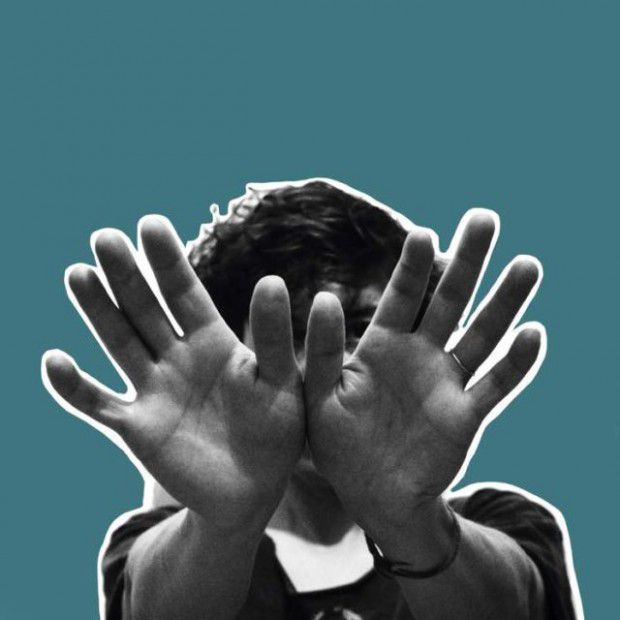
Tune-Yards
『I can feel you creep into my private life』
(4AD/Beat Records)
Now On Sale
http://www.beatink.com/products/detail.php?product_id=9124
